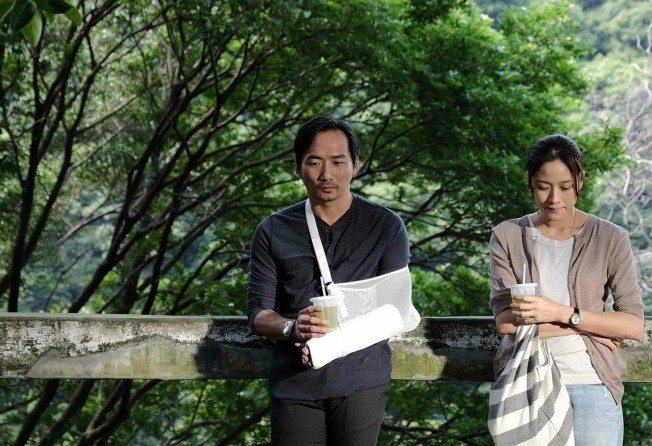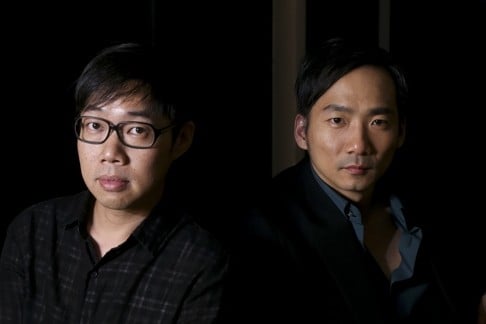Mourning glory: Taiwanese director Tom Lin Shu-yu channels his grief into art
Lin’s new film, which follows the healing processes of two bereaved people, is not only close to his heart but has also struck a chord with viewers

Tom Lin Shu-yu lost his wife of 12 years to disease in July 2012. Revered for his first two features, Winds of September (2008) and Starry Starry Night (2011), and widely regarded as one of the leading figures of his generation, the Taiwanese filmmaker began to channel his grief into a screenplay on the 107th day after his spouse’s passing.
That story has now formed the basis of his new film, Zinnia Flower, which follows the healing processes of two mourners – respectively played by Karena Lam Ka-yan and Shih Chin-hang (aka Stone, lead guitarist of pop-rock band Mayday) – in the 100 days following their partners’ deaths in a car accident.
The film premiered in July at the Taipei Film Festival before opening in Taiwanese cinemas in early October. On top of festival appearances in Busan, Vancouver and Tokyo, it has also garnered three nominations for Taiwan’s Golden Horse awards, to be announced on November 21.
The high-profile release of Zinnia Flower, which has seen Lin appear in numerous meet-the-audience sessions and talk to more than a few media outlets, prompts the question: Why did he subject himself to a project that inevitably reminded him of the death of his wife on a daily basis?
“Um …” Lin takes a long, long pause. “During promotional duties, this incident would of course be mentioned. But it was something that I knew would happen when I decided to make this film. So I had already prepared myself mentally to face this.”
We’re speaking on the evening before Zinnia Flower’s gala premiere at the Hong Kong Asian Film Festival. Lin and his co-star Shih are in a quietly contemplative mood. An MFA graduate from California Institute of the Arts in 2002, the director then tells me, unprompted, about his philosophy regarding deaths in family.
“When people face their own loss or when they talk about the loss of others, they very often use the term ‘letting go’,” says the 39-year-old Lin. “They’d tell you that, ‘Someday, the time will come that you can let go.’ Or that, ‘It’s time to let go.’
“But for me, between the moment [my wife died] and now, my feeling is rather that I’m looking to set my mind at rest. It’s impossible to let go; all you could do is to spare a part of your heart and keep [the person] properly in that space. Then you can feel at rest – you can find a way to deal with it and move forward. [But] it’s impossible to forget any part of it.”
Lin was recently in Tokyo for its film festival, and he was reassured of his belief when he visited the former fiancée of his elder brother, who died 10 years ago. “She’s now married with a kid. Everything is going well for her; then again, things also stay the same. She told me that although it’s been years, she realised she’d be carrying this [memory] for the rest of her life.”

Having previously worked with Lin on Starry Starry Night, Shih first heard about Lin’s story through a mutual acquaintance: apart from being the cinematographer for Winds of September and Zinnia Flower, Fisher Yu Jing-ping is also responsible for much of Mayday’s concert photography.
“Fisher told me about this script when we were performing at New York’s Madison Square Garden; she was there to shoot our European and [North] American concert tour,” Shih recalls. “When I learned that Lin had written a script based on his own experience, I just asked myself, ‘Who could he possibly cast in that role [of the mourning husband]?’”
Lin chuckles briefly, and Shih continues in his typically soft and gentle tone.
“It was hard to imagine who could fit into such a depressing story. Then Shu-yu approached me to discuss the role. I was quite unsure that I could do it at first, although I really wanted to. I think the destinies [of Lin and me] are connected. I really want to finish this project with him.”
So far, Lin has noticed the distinctly personal way that his film appears to be connecting with its audiences. “We did several after-screening Q&As in Taipei, and they were significantly different from the Q&A sessions of other films, which usually revolve around how we shot a film or how an actor interpreted a character,” says the director.

“In our case, it’s more like a sharing session: when the audiences began to talk about their emotions, they would very often start crying and going into the stories of their losses. I have an impression that this film has become a source of relief for some viewers. I’m surprised by how many people ended up sharing their stories with us.”
Shih sees similarities between Zinnia Flower and the artist Marina Abramovic’s performance at her Museum of Modern Art retrospective, which the actor watched in the documentary film The Artist is Present (2012). “When people came to sit face-to-face with her, they cried,” he says.
“I think this film has a similar power to that performance. The film doesn’t tell you anything specific. It doesn’t show you anything special. But it has turned out to become a mirror of sorts. When the audiences come to watch this film, they’re not so much watching this story as they’re seeing themselves and reliving their own sadness.”
Considered in that light, Zinnia Flower has turned out to be an unusually cathartic effort for a director commonly known for his film’s autobiographical roots, as seen in his 2005 short The Pain of Others and his first full-length feature, Winds of September.
“They are stories that I wanted to tell – stories that, at the time I made them, felt very important to me. It’s hard to explain, but my inspirations are taken from my life,” says Lin.

With Zinnia Flower, the director is steadfast that he should “treat the subject [of grief] honestly”. He says, “I knew that I shouldn’t try to make it too dramatic. This narrative doesn’t develop in the way that I think the audience might prefer. This film has to maintain its own identity.”
That persistence has subsequently resulted in the cutting of an emotional sex scene – involving Lam’s character – after the film’s Taipei Film Festival screening, as Lin felt that the heated debate surrounding that topic had diluted his focus.
“Some people liked that scene a lot and some hated it. It was as if the film hinges on that scene, but it’s really about something much bigger,” he says. “With this film, I’m aiming to project an authenticity to the [grieving] experience. I’m not setting out to test the audience’s limits.
“And if that was my purpose, I could’ve done a Lars von Trier instead,” Lin adds with a smile.
Zinnia Flower opens on November 19